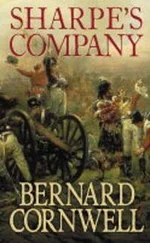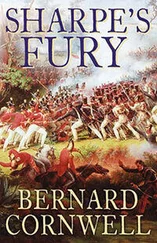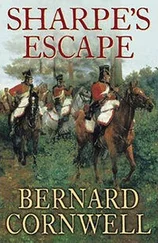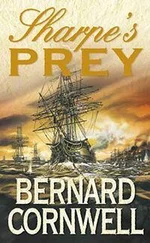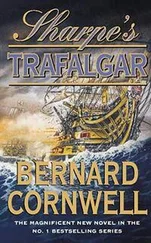“In Calais? That’s a very bleak choice, if you’ll forgive me.” Frederickson frowned suddenly. “My God! It’s your damned pride, isn’t it? You fear to go to England because of Jane and that wretched man? You think you’ll be mocked because you’ve been cuckolded?” Frederickson scorned the fear with a dismissive flick of his napkin. “My dear Sharpe! Kill the man in a duel and no one will dare mock you!”
“No.” Sharpe hated saying it, but it had to be said. “It’s nothing to do with Jane, and I’m not staying in Calais. I’m going back to Normandy.”
Frederickson stared at Sharpe for a long long time. And, for a long long time, he said nothing, but then, and as though it took a great effort, he finally found his voice. “To Lucille?”
“To Lucille,” Sharpe confirmed.
“And she?” Frederickson hesitated. There was real pain on his bruised face, evidence of just how hard his dreams were breaking into misery. “And she will consent to your arrival at the chateau?”
“I believe she will.”
Frederickson briefly closed his one eye. “And may I ask whether you have grounds for this belief?”
“Yes,” Sharpe spoke very quietly, “I do.”
“Oh, God.” Now it seemed there was nothing but hatred in Frederickson’s gaze. Or else he felt a pain so deep that it could only show on his face as hatred.
Sharpe tried to explain. He heard himself stammering as he told the old story; of how a dislike of the woman had turned into a friendship, and then how the friendship had turned into love, and he remembered, but did not tell Frederickson, how on that black night of sky-breaking thunder he and Lucille had met in the passageway and not a word had been said, but she had come to his room and afterwards, as she slept, and as Sharpe had listened to the rain pouring from the gutters, he had thought that never before had he known such peace. “I should have told you weeks ago,” he said miserably, “but somehow…”
Frederickson broke Sharpe’s words off by abruptly standing and turning away. He walked to the fireplace and stared down at the coal fire which sputtered damply in the grate. “I don’t want to hear any more.”
“I didn’t want to hurt you,” Sharpe said lamely.
“God damn you!” Frederickson turned on Sharpe in a sudden blind fury.
“I’m sorry.”
“I don’t need your bloody pity! God damn you! How many damned women do you want?”
“William…“
“Damn you! Damn you! Damn you! I hope she breaks your bloody heart like the last one did!” Frederickson was still holding his napkin which, in petulant anger, he threw towards Sharpe. Then, saying nothing more, he snatched up his greatcoat and sword, then stormed from the room.
Sharpe stooped, retrieved the crumpled napkin, and smoothed it on the table. He thought of following Frederickson outside, but he knew it would do no good. Instead he sat for a long time, empty-eyed, watching the sea.
Harper came very quietly into the room, looked at Sharpe, then held his hands towards the feeble fire. “So you told him, sir?”
“I told him.”
“God save Ireland,” Harper said of nothing in particular, then he stooped and shoved at the coals with a poker made from an old French bayonet. “It wouldn’t have worked, of course,” he said after a while, “but I suppose he’d never be convinced of that.”
“What wouldn’t have worked, Patrick?”
“Mr Frederickson and Madame. He doesn’t like the women, you see. I mean he likes them well enough, but he’d never make a woman into a friend now, would he? It isn’t enough to take them to your bed. You have to actually like them, too.”
Sharpe smiled. “Is that so, Mr Harper?”
“It is Mr Harper now, isn’t it?” Harper laughed. In his pocket the Irishman had his discharge papers, signed by the Duke of Wellington himself. Mr Harper was a free man now, going to England where he would catch a fast ship for Spain, after which, with Isabella and the baby, he would go home to Ireland. Home for good, he said, home to where the rain fell on thin fields from which a poor people scratched their daily bread.
Sharpe stood and led the Irishman out to the quayside. There was no sign of Frederickson on the packet’s deck, though his luggage, along with Harper’s heavy pack, lay stacked beside an open hatchway. Sharpe turned away from the gangplank and walked with Harper to where the packet boat’s bowsprit reared tar-black against the sullen clouds. “I don’t know what to say, Patrick.”
“Nor me, sir,” Harper spoke softly, “but we’ve had some good times, sir, so we have.”
“We’ve had some bloody terrible ones, too,” Sharpe laughed. “You remember that day you fought me in the snow?”
“You cheated, sir, or else I’d have split your skull wide open.”
“I’d never have beaten you without cheating.”
They fell silent. A slew of gulls shrieked and tumbled above the fish quay. Rain fell in a sharp stinging slant.
“If you’re ever in Normandy?” Sharpe suggested.
“Of course, sir. And if you ever take yourself to Donegal then you’ll know there’s a rare welcome for you. Go to Derry, keep going west, and someone will know where the big fellow back from the wars will be.”
“Of course I’ll come. You know I’ll come.”
Harper thrust his hand deep into the pocket of his fine civilian greatcoat. “You’re all right for the money, are you now?”
“You know I am.” Sharpe had pocketed some of the gold coins as he had loaded the small grasshopper gun, just as Harper had filched a few handfuls of gems from the big strongbox. “I owe you money anyway,” Sharpe said.
“Pay it when you come to Ireland,” Harper said.
The packet’s bosun shouted for the last passengers. A headsail was already being hoisted, and it was time for Harper to leave. He looked at Sharpe and neither man could find anything to say. They had marched all the soldiers’ miles together, and now their ways parted. They would promise reunion, but such promises were so rarely kept. Sharpe tried to say what he felt, but it would not come, so he gave his friend an embrace instead. “Look after yourself, Patrick.”
“I’ll do that.” Harper paused. “It is the right thing you’re doing, sir?”
“Not for Mr Frederickson, it isn’t.” Sharpe shook his head. “I don’t know, Patrick. I wish I did.” Going back to Normandy was like the roll of a dice, or the whim of an action in battle. There was no rationality to it, but life did not yield to reason, only to instinct. “I think it’s the right thing. I want it very much, if that’s any answer. And I’m not certain I want to live in England. They’ll never accept me there. To them I’m just a bastard upstart who can use a sword, but in peacetime they’ll spit me out like a speck of rotten meat.”
“And if they want your sword again?” Harper asked.
Sharpe shrugged. “We’ll see.” Then the bosun bellowed his impatient summons again, and the last passengers broke from their farewell embraces and hurried towards the gangplank. Sharpe gripped Harper’s hands. „I’ll miss you, Patrick. You were an awkward bugger, but by God I’ll miss you.“
“Aye.” Harper could not find the proper words either, so he just shrugged. “God bless you, sir.”
Sharpe smiled. “God save Ireland.”
Harper laughed at Sharpe’s mimicry. „I’ll come and find you, sir, if you don’t come and find me.“
“I hope you do. Maybe we’ll meet halfway.”
Harper turned and walked away. Sharpe watched the Irishman board the packet, he waved once, but then Sharpe turned away so that the parting would not be prolonged. He heard the flogging sound of the wind catching the great mainsail as it was hoisted.
Читать дальше

